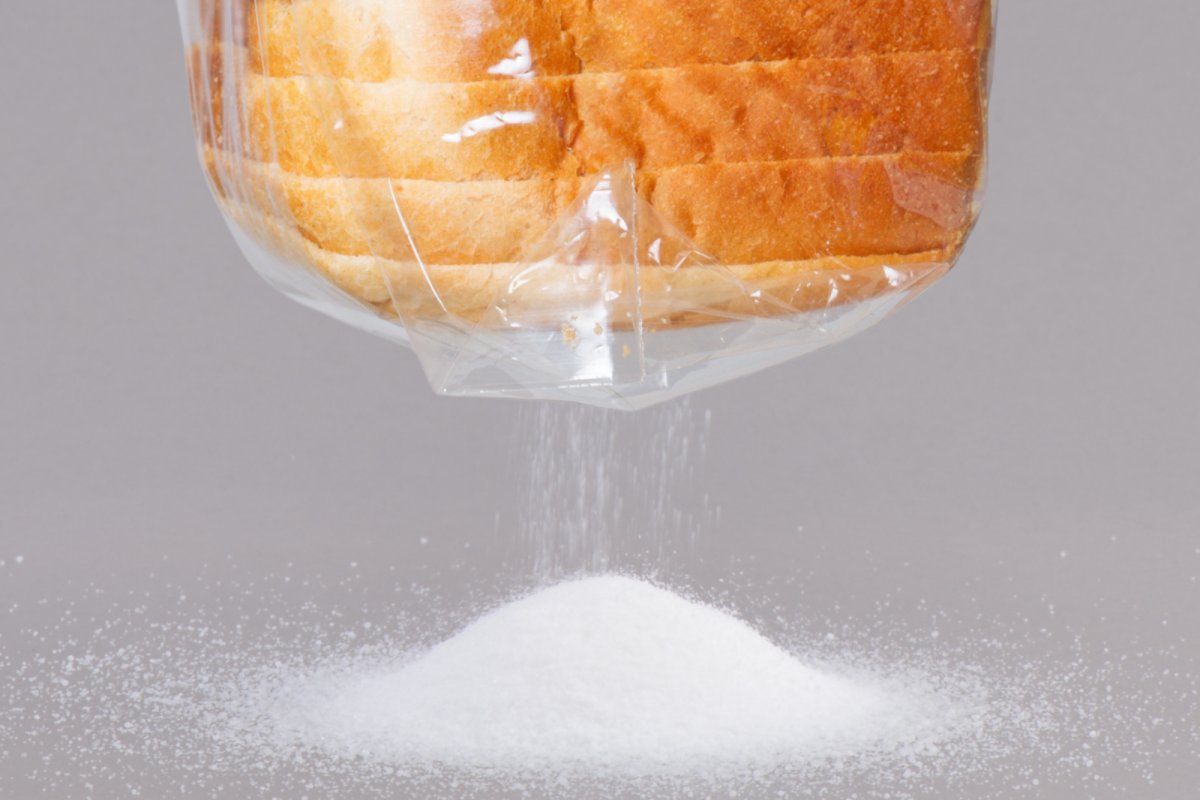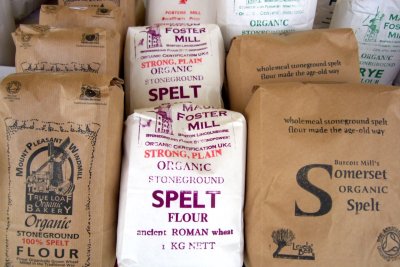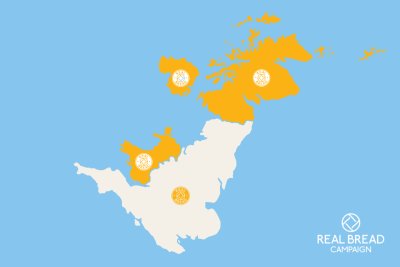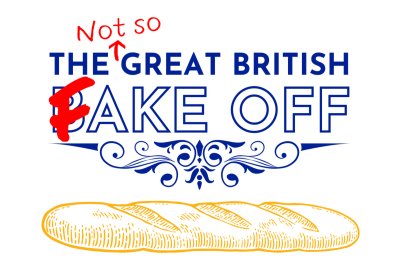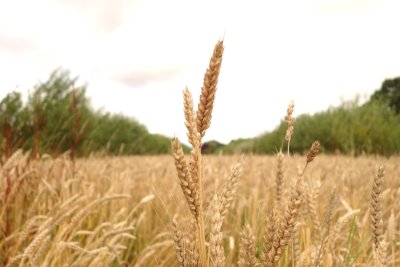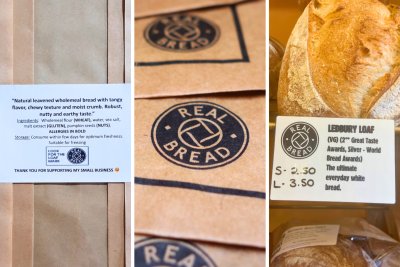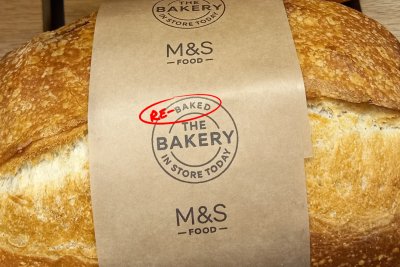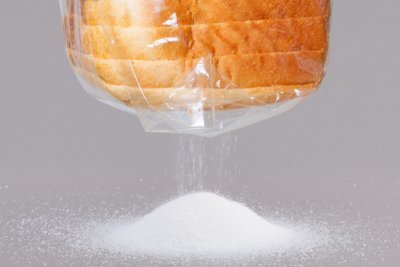 Salty supermarket loaf product. Credit: Chris Young / www.realbreadcampaign.org CC-BY-SA-4.0
Salty supermarket loaf product. Credit: Chris Young / www.realbreadcampaign.org CC-BY-SA-4.0
On 30 March 2023 Action on Salt, a scientific expert group based at Queen Mary University of London, published a study of 242 branded and own-brand wrapped, sliced industrial loaf products sold by Aldi, Asda, Iceland, Lidl, Marks & Spencer, Morrisons, Sainsbury’s, Tesco, The Co-operative and Waitrose. The brands included Allinson’s, Hovis, Kingsmill and Warburtons.
They reported:
- Three in four of the loaves contained as much, or more, salt per slice than a packet of a popular brand of ready salted crisps (0.34g per 25g packet).
- A serving* of some industrial loaf products was saltier than two small portions of fries (0.44g salt per portion) from a clown-associated burger chain.
- Two slices of Hovis Soft White Thick Sliced had as much salt (1.2g) as a hamburger from that same fast food chain, equating to a fifth of an adult’s maximum daily salt intake.
- The saltiest product, Hovis White Loaf with starter dough, contained 1.48g salt per 100g.
*Five products contained 0.9g or more per serving as suggested on pack - typically 2 slices.
This is far in excess of Public Health England’s voluntary salt reduction targets for the ‘Bread and Rolls’ category, which are 0.85g per 100g (average across product type) and 1.01g per 100g (maximum for an individual product).
While the overall average salt level had fallen since Action on Salt carried out a similar study in 2011, some products had actually been made saltier. Salt in Marks & Spencer's Oaty Bloomer had increased by 38%, Hovis Granary was up from 1.05g to 1.28g per 100g (22% increase) and Sainsbury's Medium Wholemeal had risen by 19%.
Real Bread Campaign coordinator Chris Young said: “The Real Bread Campaign has always encouraged all Real Bread bakers, as well as industrial loaf manufacturers, to ensure that salt levels do not exceed the target maximum. While it’s concerning that salt levels in some industrial loaf products are still way above the target set back in 2006, let alone the current one, it’s good to see that other manufacturers have made progress.”
The report’s recommendations included the Government switching from voluntary to mandatory salt reduction targets.
The Real Bread Campaign highlights that ways to avoid such salty products (and the range of addtives they contain) include:
- making Real Bread at home and using no more than 1g salt for every 100g of flour.
- buying Real Bread from a local, independent bakery that can assure shoppers they follow the government guidance.
NB this study was of factory loaves exclusively, rather than of Real Bread. As such, it would be inappropriate for any commentary to refer to the findings being based on a study of ‘bread’ without qualification or definition of the term.
Read the Campaign's guide to salt in bread
More findings
- Branded products had a higher average salt content (0.94g/100g) than supermarket own brand (0.87g/100g)
- An average salt content of 0.9g per 100g and 0.38g per slice across the 243 products.
- An average salt reduction of around 8% in 50 products that Action in Salt looked at in 2011 and 2023.
- Three of the five saltiest products in the sourdough category of the report are in fact what the Campaign calls sourfaux – named sourdough but made using baker’s yeast and/or additives.
Salt and health
The report notes: “Decades of consistent, high-quality research has linked excessive salt intake to raised blood pressure, a major risk factor for heart attacks and stroke and the leading causes of death and disability worldwide. The recommended salt intake in the UK is less than 6g a day for an adult, however the latest figures show we are eating 40% more than this (8.4g/day).”
It goes on to say: “For every 1g reduction in population salt intake, it’s thought that more than 4,000 premature deaths could be prevented each year, with annual health savings to the NHS at £288million. Reducing salt intake has therefore been identified as one of the most cost-effective measures that any country should take to improve population health outcomes.”
Why focus on this category?
There was criticism in the past of highlighting the salt content of bread and industrial loaf products, on the grounds that there are many foods that are saltier.
Action on Salt points out that bread (or, at least, products sold as ‘bread’) “accounts for 14% of our daily intake of salt, making it the largest contributor to salt in our diet.”
Real Bread Campaign: The Real Bread Campaign finds and shares ways to make bread better for us, better for our communities and better for the planet. Whether your interest is local food, community-focussed small enterprises, honest labelling, therapeutic baking, or simply tasty toast, everyone is invited to become a Campaign supporter.
Sustain
The Green House
244-254 Cambridge Heath Road
London E2 9DA
020 3559 6777
sustain@sustainweb.org
Sustain advocates food and agriculture policies and practices that enhance the health and welfare of people and animals, improve the working and living environment, promote equity and enrich society and culture.
© Sustain 2024
Registered charity (no. 1018643)
Data privacy & cookies
